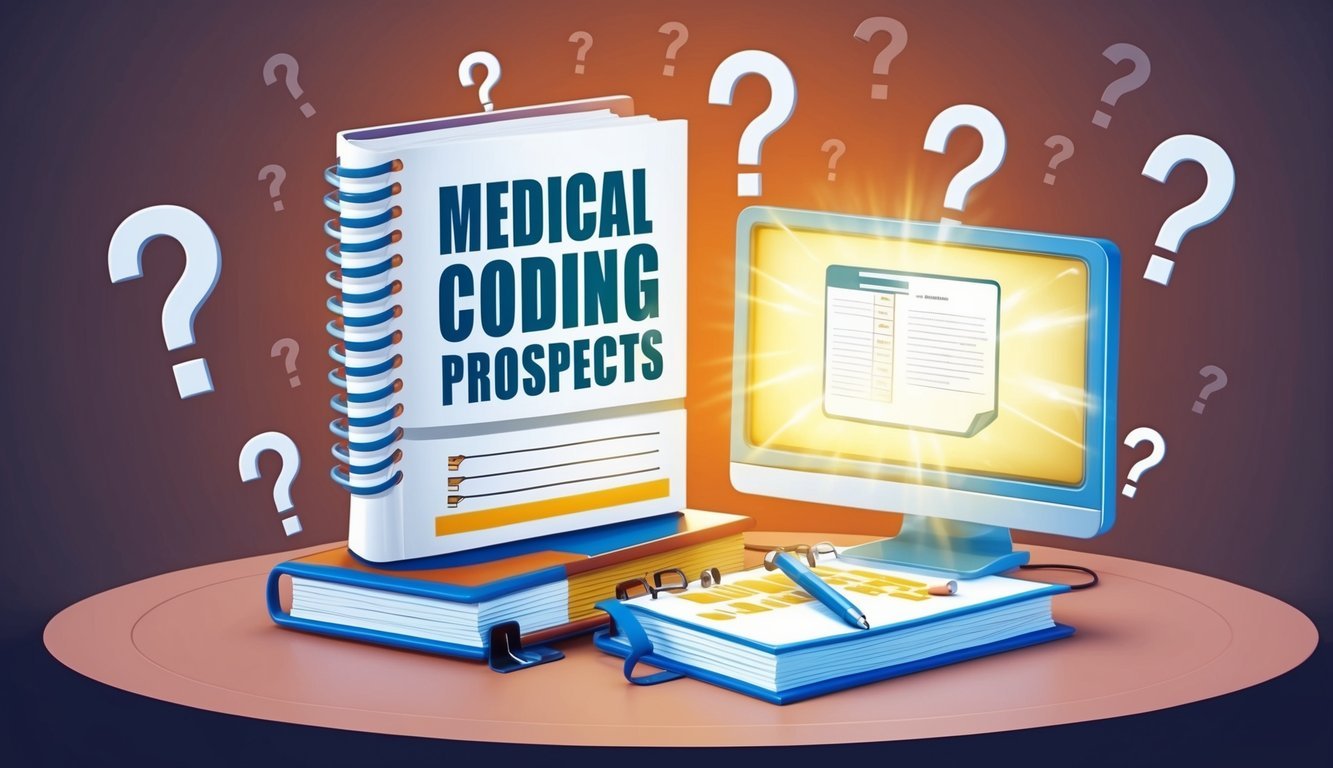In an era of rapid technological advancement, many prospective medical coders worry about their job security.
They’re concerned about the rise of automation and artificial intelligence in healthcare. However, the reality is that medical coding is far from obsolete, and the demand for skilled medical coders remains strong.
As healthcare providers increasingly rely on accurate coding for reimbursement and compliance, the need for certified professionals continues to grow.
This is particularly true as new coding systems and regulations emerge.
These create additional opportunities for those with expertise in medical coding.
You may discover that a career in this field not only offers stability but also opens doors to various paths within healthcare administration.
By understanding the landscape of medical coding today, you can make informed decisions about your career trajectory.
The insights provided here will help you see how a career as a medical coder can be rewarding and essential in the ongoing evolution of healthcare delivery.
Understanding Medical Coding
Medical coding plays a crucial role in the healthcare system by converting healthcare services into universal codes.
This process ensures accurate billing, health information management, and effective communication between providers and insurers.
Basics of Medical Coding
Medical coding involves the transformation of healthcare diagnoses, procedures, medical services, and equipment into universal alphanumeric codes.
These codes are essential for billing and insurance purposes.
The coding process typically includes:
- ICD Codes: Used for diagnosing conditions.
- CPT Codes: Used for medical procedures.
- HCPCS Codes: Used for services and equipment not covered by CPT.
Understanding these coding systems helps you navigate the healthcare landscape efficiently.
Accurate coding is essential for healthcare providers to receive proper reimbursement for their services.
The Role of a Medical Coder
As a medical coder, you are responsible for interpreting medical documentation and assigning the correct codes for billing purposes.
This requires a thorough understanding of medical terminology, anatomy, and coding guidelines.
Key responsibilities include:
- Reviewing patient records for accuracy.
- Assigning codes to diagnoses and procedures.
- Ensuring compliance with regulatory requirements.
Your skills are critical for reducing billing discrepancies and preventing claim rejections.
Being knowledgeable in medical billing, you’ll help facilitate smoother transactions between healthcare providers and insurers.
Importance in Healthcare
Medical coding is vital for several reasons, including:
- Revenue Generation: Accurate coding ensures providers are reimbursed for services rendered.
- Data Management: Helps in tracking healthcare trends and statistics for better policies.
- Compliance: Adherence to coding regulations protects against legal issues.
Without efficient coding, the financial health of healthcare organizations is at risk.
You contribute significantly to the overall efficiency of the healthcare system through your work in health information management and the medical coding process.
Industry Overview and Employment Trends

The medical coding industry reflects a dynamic job market that continues to evolve with healthcare needs.
Understanding the current employment landscape, predictions for job growth, and the impact of automation is essential for aspiring medical coders.
Current Job Market
The job market for medical coders is showing positive signs.
With an aging population and ongoing healthcare reforms, there’s an increasing demand for accurate medical coding.
The U.S. Bureau of Labor Statistics has projected a 7% growth in employment for medical records specialists by 2031.
This aligns with growth in the broader healthcare sector, which is expected to expand by 7% annually.
| Market Indicator | Details |
|---|---|
| Current Job Growth | 7% through 2031 |
| Overall Healthcare Growth | 7% annual growth |
| Increased Demand | Due to aging population and healthcare needs |
Predictions on Job Growth
Future projections are also promising.
The demand for medical coders is anticipated to rise significantly due to advances in technology and an increasing volume of healthcare services.
As healthcare expands, the need for proficient medical coding becomes crucial.
Reports indicate that AAPC certified coders maintain job resilience despite economic fluctuations, offering them a stable employment outlook.
You can explore more about salary trends and opportunities in the 2024 Medical Coding and Billing Salary Report.
Impact of Automation
Automation is reshaping numerous sectors, including healthcare.
However, rather than eliminating jobs, it is likely to change the roles of medical coders.
AI-assisted coding systems and coding robots are emerging, enhancing efficiency and accuracy.
Medical coders will need to adapt by acquiring skills to work alongside these technologies.
The integration of automation can streamline processes, allowing you to focus on more complex coding tasks that require human expertise.
For an in-depth look, consider reading about industry trends in the Future of Medical Coding.
Adaptability and continuous learning are key to thriving in an evolving job market where technology plays a pivotal role.
Educational Pathways and Certification

To pursue a career in medical coding, understanding the educational pathways and certification options is crucial.
This field offers various routes for obtaining the necessary credentials that align with industry requirements.
Coding Certification Requirements
To become a Certified Professional Coder (CPC), you’ll typically need to complete a coding certification program.
The American Academy of Professional Coders (AAPC) requires candidates to pass an exam that tests knowledge in coding systems like ICD-10, CPT, and HCPCS Level II.
Additionally, AAPC mandates that candidates have some level of experience in the medical coding field.
Beginners can opt for entry-level certifications, while experienced candidates may pursue advanced credentials.
Keep in mind that each credential may have its own prerequisites, such as continuing education units (CEUs) every two years to maintain certification.
Medical Coding Courses and Training
Medical coding courses vary in length and depth, with options available through community colleges, for-profit institutions, and online platforms.
Standard programs cover essential topics, including anatomy, medical terminology, and coding guidelines.
You can find programs that lead to certifications like Certified Coding Associate (CCA) offered by the American Health Information Management Association (AHIMA).
Some institutions also offer specialized training for specific areas like outpatient coding or risk adjustment.
Make sure to choose a program that fits your career goals and provides practical training opportunities.
Accreditation and Credentials
Accreditation is essential when selecting a medical coding program.
Look for schools accredited by recognized organizations, such as AAPC or AHIMA.
Accreditation ensures that the education you receive meets industry standards and enhances your employability.
After completing your coursework, obtaining a coding credential is vital.
Popular certifications include the CPC, CCA, and Certified Coding Specialist (CCS).
Holding these credentials not only validates your expertise but also opens doors to better job opportunities and higher salaries in the healthcare sector.
The Integration of Technology in Medical Coding
Technology plays a crucial role in transforming medical coding by enhancing efficiency and accuracy.
Two significant aspects of this integration are the influence of artificial intelligence and the widespread adoption of electronic health records.
Role of Artificial Intelligence
Artificial intelligence (AI) has become instrumental in medical coding.
It automates various tasks, such as data extraction and classification from patient records, significantly reducing human error.
AI tools can analyze large datasets quickly, ensuring coders have data consistency and accuracy.
For example, systems can flag coding discrepancies or suggest codes based on patient information.
Moreover, AI algorithms continuously learn and adapt, enhancing their capabilities over time.
This means better support for coders, allowing them to focus on complex cases that require human judgment.
The Advent of Electronic Health Records
The shift to electronic health records (EHRs) has revolutionized medical coding.
EHRs enable healthcare organizations to maintain comprehensive patient data in real-time, improving accessibility for coders.
With structured data entry, EHRs help ensure codes accurately reflect patient diagnoses and treatment paths.
This minimizes billing disputes and improves the overall workflow in the coding process.
Additionally, EHRs facilitate seamless collaboration among healthcare professionals.
This interconnectedness allows coders to receive timely updates on patient status and treatment changes, which is essential for accurate coding.
As technology evolves, the synergy between AI and EHR systems will likely lead to even more streamlined processes in medical coding, emphasizing the importance of skilled coders in the healthcare landscape.
Advancing Your Career in Medical Coding
Advancing your career in medical coding requires a robust set of coding and soft skills, alongside continuous education and specialization opportunities.
These factors not only enhance your employability but also pave the way for leadership positions in the healthcare industry.
Skills for Career Advancement
To move forward in your medical coding career, it’s essential to develop both technical and interpersonal skills.
Key coding skills include:
- Attention to Detail: Precision in coding directly impacts reimbursement and compliance.
- Analytical Thinking: Ability to interpret complex medical documentation is crucial.
- Technical Proficiency: Familiarity with coding software and electronic health records (EHR) systems enhances efficiency.
Alongside these technical skills, soft skills also play a pivotal role.
Strong communication, teamwork, and problem-solving skills help in collaborating with healthcare professionals.
These competencies will make you not only a valuable coder but also a potential leader in the healthcare setting.
Paths to Specialization
Specialization can significantly boost your career prospects.
Consider focusing on areas like:
- Outpatient Coding: Specializing in coding for outpatient services provides a unique skill set that is in high demand.
- Inpatient Coding: This expertise is essential for hospitals and can lead to higher-paying positions.
- Health Information Technician: This role often encompasses a broader scope, including data management and compliance-related tasks.
Certifications such as Certified Professional Coder (CPC) or Certified Coding Specialist (CCS) can further set you apart in the job market.
They signal your commitment to excellence and ethical coding practices.
Continuing Education and Networking
To thrive, you must prioritize continuous education.
Online courses and workshops offer the flexibility to keep your skills updated.
Professional organizations, like the AAPC, provide resources and credentialing opportunities that can enhance your expertise.
Networking is equally important.
Attend industry conferences and join online forums relevant to medical coding.
Building relationships with other professionals allows you to exchange knowledge and gain insights into career opportunities.

